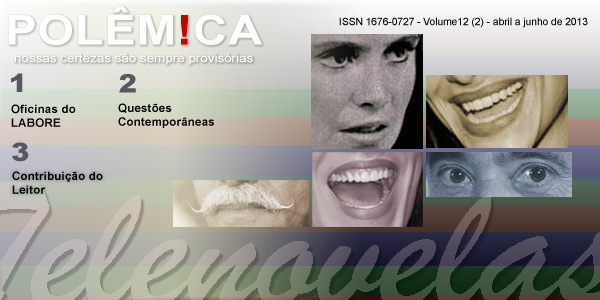A TELENOVELA BRASILEIRA E A CULTURA DE MASSA: UMA RELAÇÃO MUITO ALÉM DO ZAPPING
DOI:
https://doi.org/10.12957/polemica.2013.6424Resumo
Herdeira dos folhetins, a telenovela nada mais é do que a versão eletrônica deste gênero literário, que surgiu, no século XIX, para dar conta da demanda por entretenimento do povo que, pela primeira vez na história, tinha conquistado o direito ao lazer. Como se percebe, a história do folhetim está intimamente ligada à história do lazer, um fenômeno da Era Moderna, que surgiu a partir da Revolução Francesa e se intensificou com a Revolução Industrial. Enquanto cultura de massa, o sucesso da Telenovela Brasileira se encontra relacionado à proximidade do cotidiano do receptor e da “linguagem comum”. Percebe-se que, de uma maneira geral, os roteiros podem falar com todas as camadas da sociedade, não privilegiando uma ou outra. Essa qualidade também se vê atrelada ao “abrasileiramento” dos enredos nas Telenovelas Brasileiras, em especial, a partir das décadas de 70 e de 80, quando ganham o “status de produto mais rentável da indústria cultural brasileira”. Assim, o objetivo geral deste texto é refletir sobre o papel da telenovela, no contexto brasileiro, relacionando-a com a cultura de massa e a grande aceitação por parte do público receptor. Para tanto, revisita-se os principais conceitos de cultura de massa trabalhados por Umberto Eco em Apocalípticos e Integrados (2004), e por Alfredo Bosi em Dialética da Colonização (1992), entre outros, na busca por aproximações possíveis com este tipo de narrativa televisiva. Para a adequação aos conceitos propostos, adotou-se como metodologia a pesquisa bibliográfica. Como resultados alcançados, o aprofundamento teórico possibilitou o resgate da importância dessa manifestação artística no cenário cultural, reforçando sua contribuição na formação da atual sociedade brasileira.
Palavras chave: telenovela brasileira; cultura popular; sujeito; espectador.Downloads
Publicado
Como Citar
Edição
Seção
Licença
Cabem ao autor/autora os direitos autorais dos artigos publicados na Polêm!ca, resguardando-se à revista o direito de primeira publicação. Cientes, revista e autores/as, que todos os artigos são de uso gratuito, para fins educacionais e não-comerciais, permitindo que outros remixem, adaptem e construam sobre o trabalho, desde que citada a fonte, quando da sua utilização integral ou parcial, de acordo com a licença Creative Commons CC BY-NC.
O(s) autor(es) tem/têm autorização para assumir contratos adicionais separadamente, para distribuição não-exclusiva da versão do trabalho publicada nesta revista (ex.: publicar em repositório institucional ou como capítulo de livro), com reconhecimento de autoria e publicação inicial nesta revista.
Respeitando a licença autoral adotada pela Polêm!ca, estimulamos nossos leitores a promover, refletir e escrever, a partir das nossas publicações, incluindo nas citações o link para o artigo disponível no site da Revista Polêm!ca, sempre que um artigo for citado ou replicado, e observando a grafia correta do nome da revista Polêm!ca.
Todo o conteúdo de terceiros (imagens, trechos, citações, etc.) deverá possuir referências a sua fonte original adicionadas como notas de rodapé ou referências bibliográficas com sua devida identificação.
Artigos submetidos que contiverem citações, tabelas ou imagens extraídas de outras publicações não serão aceitos, caso possuam mais conteúdo de terceiros do que conteúdo original.

Revista Polêm!ca está licenciada com uma Licença Creative Commons Atribuição-NãoComercial 4.0 Internacional.



